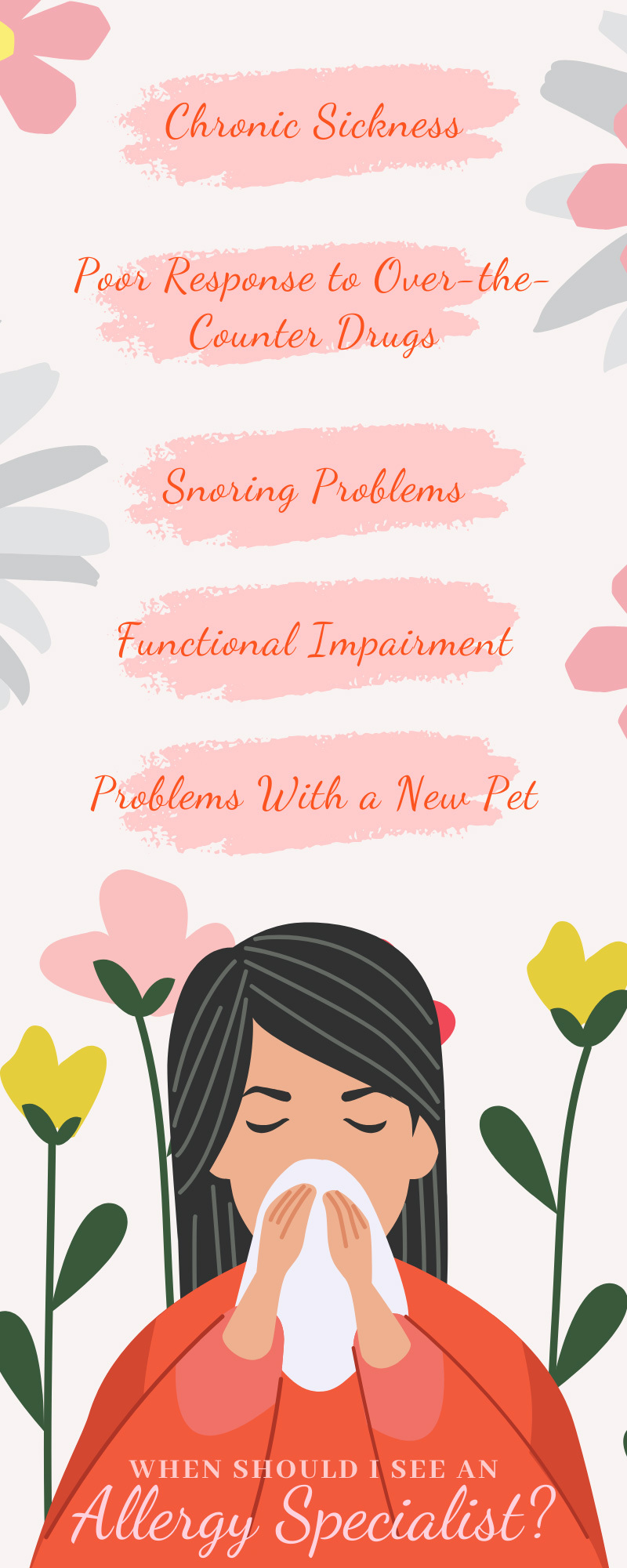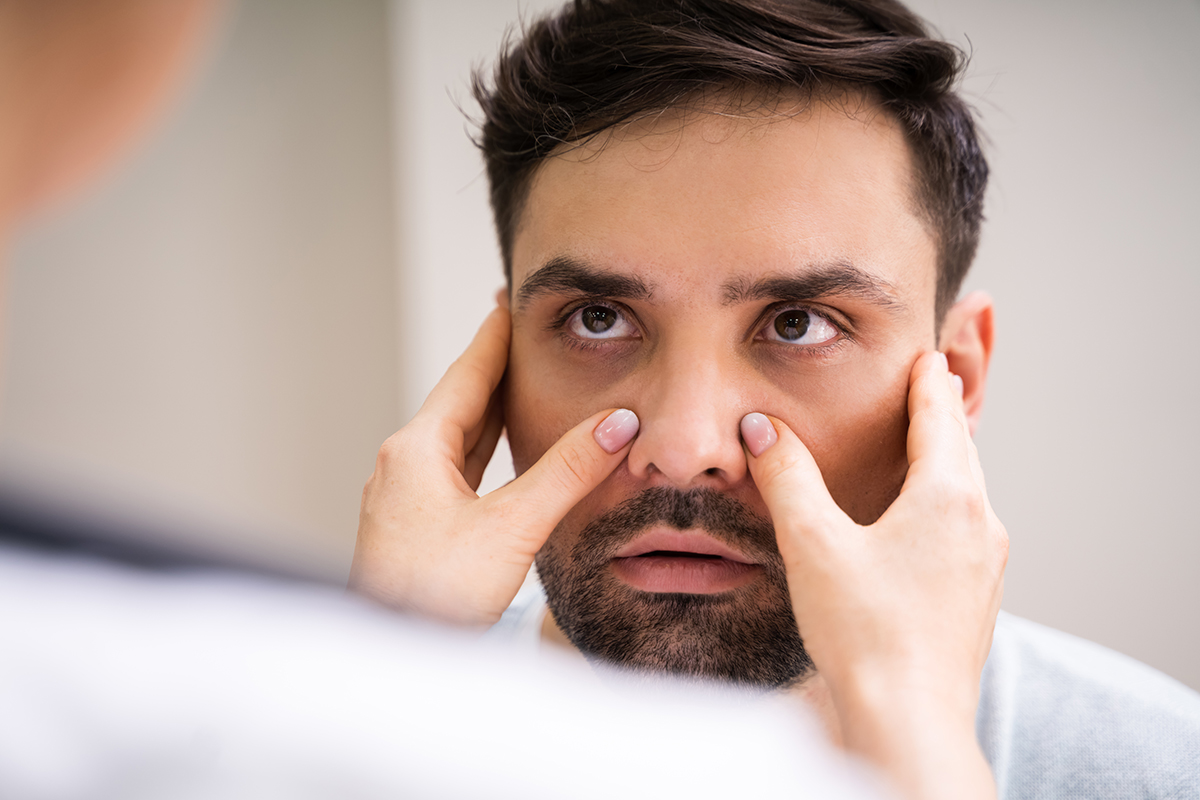
From a mild case of hay fever to a life-threatening case of anaphylactic shock, allergic reactions touch millions of lives. In many cases, we’re able to deal with allergies by popping a pill or powering through. However, minimal responses are often insufficient. Sometimes, a visit to your family doctor may be necessary to gain a stronger prescription or deeper insight. Finally, some instances may require the specialized expertise of an allergist. Consult this guide to some common situations for when you should see an allergy specialist.
Chronic Sickness
Arguably the most common reason that patients seek the care of allergists is that they are dealing with conditions that never seem to resolve—and when they finally do, they resurface in short time. A runny nose, watery eyes, or congestion that persist for weeks on end are as frustrating as they are uncomfortable. A good rule of thumb is that if you’ve dealt with an allergic reaction such as sinusitis or cold-like symptoms that have not abated for over a month, or if you’ve had three of these long-term illnesses over the course of a year, you should consult an allergist to determine the cause of your sickness and what to do about it.
Poor Response to Over-the-Counter Drugs
We can take care of many pesky allergic reactions without a doctor’s care. Today’s pharmacies carry numerous lines of over-the-counter medications that counteract the immune system’s histamine response to perceived pathogens. These can be useful as short-term solutions to transient conditions. When allergic reactions become chronic, however, reliance on traditional OTC antihistamines is an insufficient response. Users may experience diminishing efficacy of over-the-counter drugs, and the sedation that accompanies most antihistamines can interfere with daily life. When trips to the drugstore aren’t enough to treat allergies, it’s time to see a specialist. You may need a prescription for more effective medication or perhaps a closer look at what could be causing these allergic reactions in the first place.
Determining Mysterious Allergies
The battery of allergy tests that leaves a long and orderly line of needle marks along the subject’s arm is perhaps the most infamous aspect of seeing an allergist. In this test, an allergist injects you with trace amounts of known allergens, such as the pollens from various grasses and trees, food allergens, proteins in pet dander, and molds. Injection sites that demonstrate significant inflammation indicate allergic reactions to those substances. This can help you deduce once and for all which plants and foods you need to go out of your way to avoid. For instance, Timothy grass, a type of grass whose most recognizable feature is its cattails, spreads pollen that not only causes allergic reactions in many people but bears striking commonality to enzymes in certain fruits and vegetables. In turn, this causes a reaction known as oral allergy syndrome. If watermelons have been making you sick, your body’s hypersensitivity to this unrelated grass may be why.
Functional Impairment
It’s one thing to quietly suffer from months’ worth of congestion and headaches as you lament the loss of your quality of life. When the symptoms of chronic allergies encroach upon your ability to complete daily tasks, it’s no longer viable to keep your condition in the background. Allergies can prevent you not only from doing the things in life you’d like to, but the things you need to—chronic allergy sufferers often find themselves struggling to concentrate at work, taking an abundance of sick days, and having difficulty driving.
Allergic reactions keep us up at night, taking away necessary hours of sleep and leaving us operating at less than 100 percent the next day. This fatigue can lead to slower reaction times, muddled thinking, and erratic mood swings. These conditions can enfeeble you and endanger others, and it may all begin with untreated allergic reactions. If you’re not functioning at your best and cannot tolerate at diminished capacity anymore, it’s time to talk to your allergist about what you can do to get back to full strength.
Snoring Problems
The effects that allergens have on our breathing don’t just frustrate us in our waking hours. As we sleep, slightly obstructing the airway causes us to snore—and that can be frustrating for our bed partners. The materials in our bedsheets can lead to snoring issues, but it’s probably not the fine Egyptian cotton sheets to blame but rather the allergens they harbor. Bedsheets provide a warm and happy home to thousands of dust mites. These tiny arachnids innocuously feed on microscopic particles of hair and dead skin, but their waste products contain enzymes that trip many hypervigilant immune systems.
Constant exposure to these allergens at night causes allergic rhinitis that may manifest itself with night after night of loud snoring. If your airflow issues go beyond dust mite reactions, more frequent and thorough laundering of your bedsheets may not be enough to get you sleeping peacefully again.
Problems With a New Pet
Many of us don’t let—and can’t let—allergies from pet dander stop us from being animal lovers. While dander is a common allergen, some people are able to treat reactions with allergy medications or have the allergy subside due to mere exposure. Even as we’ve grown accustomed to existing cats, dogs, and birds, introducing a new pet into the home can introduce new allergic reactions that cause problems. You may also be bringing a pet home for the first time at the behest of your children, who have been asking for a puppy for so long that you had to relent. Either way, if welcoming a new animal companion poses problems, it’s something to bring up to your allergist.
Finding an Allergist
If one or more of these situations for when you should see an allergy specialist apply to you, it’s time to make the call. If you’re in the Houston area or greater East Texas, Allergy & ENT Associates features a variety of advanced options for allergy treatment. Your allergy treatment doctor will be able to help you get back to living life without chronic and pervasive allergic conditions.




